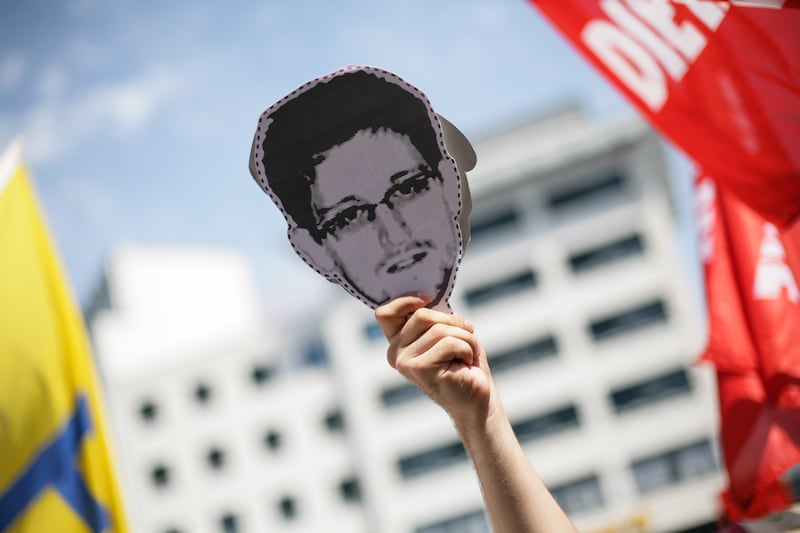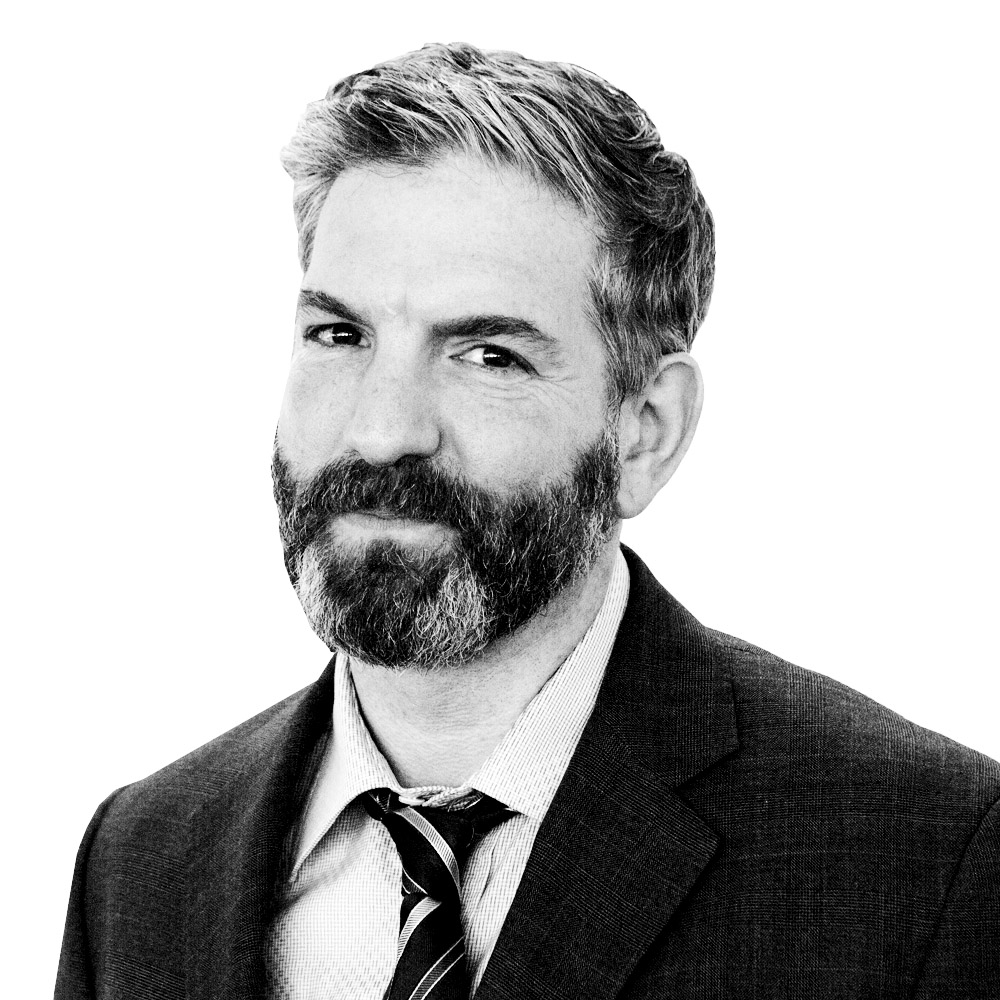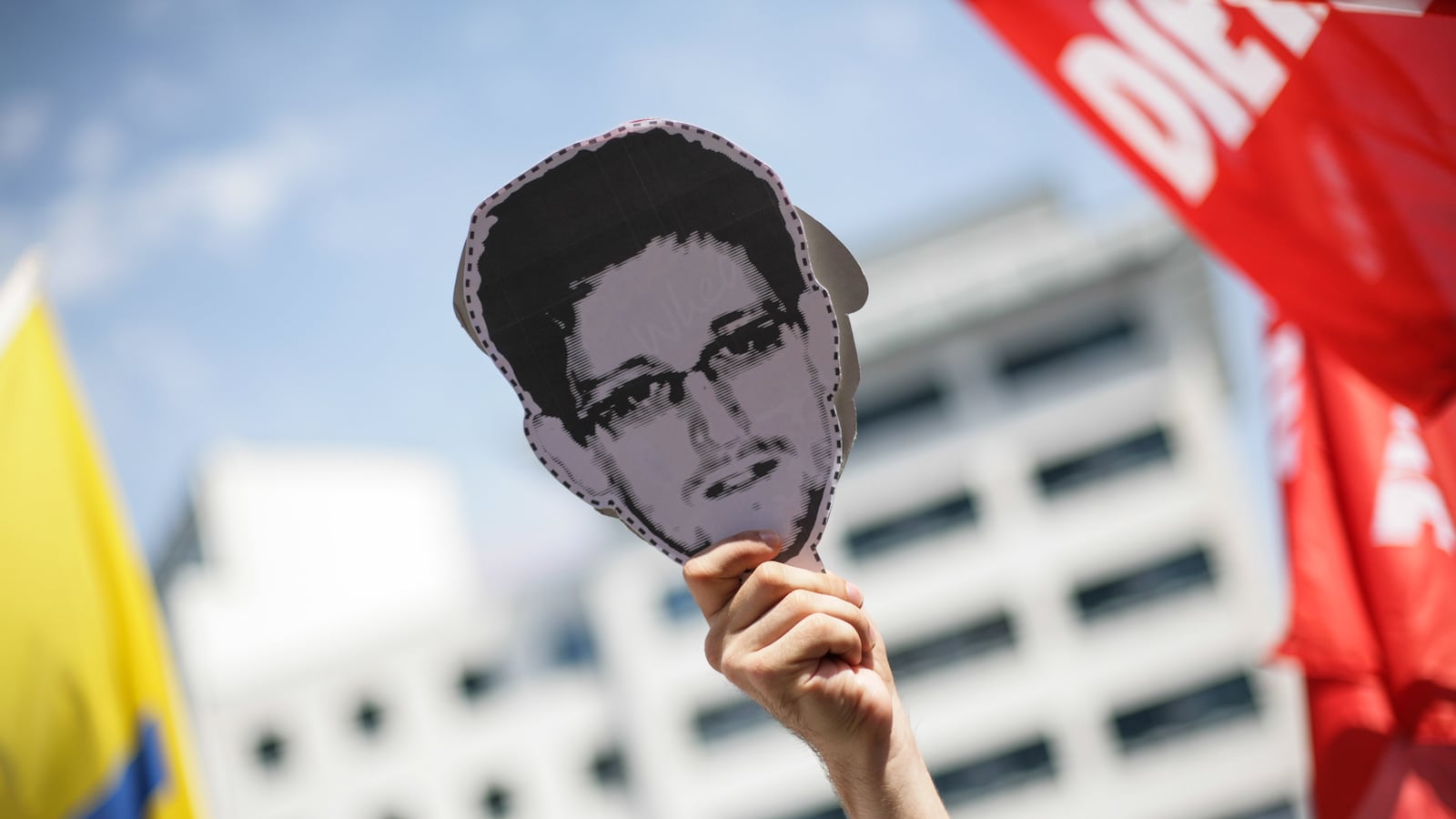NSA leaker Edward Snowden instantly regretted asking Russian President Vladimir Putin a softball question on live television about the Kremlin’s mass surveillance effort, two sources close to the leaker tell The Daily Beast.

“It certainly didn’t go as he would’ve hoped,” one of these sources said. “I don’t think there’s any shame in saying that he made an error in judgment.”
“He basically viewed the question as his first foray into criticizing Russia. He was genuinely surprised that in reasonable corridors it was seen as the opposite,” added Ben Wizner, the American Civil Liberties Union attorney who serves as one of Snowden’s closest advisers.
According to Wizner and others, Snowden hadn’t realized how much last week’s Q&A—with Putin blithely assuring Snowden that Moscow had no such eavesdropping programs—would appear to be a Kremlin propaganda victory to Western eyes. And so the leaker quickly decided to write an op-ed for the Guardian to explain his actions and to all but label Putin a liar for his televised response.
Ever since Snowden landed in Moscow under the watchful eye of the Russian surveillance state, he’s been represented in Russia by a man deeply connected to the Kremlin in addition to his American counsel. It’s one of many reasons why critics have accused the leaker of being a Putin patsy. That criticism has been accompanied by a whisper campaign from both the American and Russian governments alleging that Snowden was under the thumb of Putin’s intelligence services, a claim Snowden and his camp have strongly denied.
The talk rubbed Snowden the wrong way, his associates say. For months, he had been “looking for a situation to prove his critics wrong,” said one of his confidants—a chance to “convey to the public that he feels the same way about mass surveillance in Russia as he did about mass surveillance in the U.S.”
But it wasn’t easy in Russia, where the press is controlled so tightly by the regime. Last month, the Kremlin silenced many of the last remaining critical news outlets in the country. “In Russia, you just can’t—obviously, there’s not as much dissent as in the U.S.,” a source close to Snowden said. The Putin television program seemed to be “a high-profile opportunity” to correct the record.
Snowden’s camp wouldn’t get into the specifics of how his question made it onto the live broadcast on Russian state television. But it is worth noting that Anatoly Kucherena, Snowden’s Russian lawyer, has deep Kremlin ties and sits on the board that oversees the FSB, the successor to the KGB. Getting on state television wouldn’t have been much trouble.
With several of his key advisers offline, Snowden crafted his question for Putin. The leaker was aware that a frontal assault on the Russian leader likely wouldn’t make it past the Kremlin’s publicists. (“How do you succeed in lifting the taboo on state surveillance without being censored by state screeners?” Wizner asked.) So Snowden spent the first half of his pre-taped question talking about the ills of American surveillance. Then he said:
“Does Russia intercept, store, or analyze in any way the communications of millions of individuals? And do you believe that simply increasing the effectiveness of intelligence or law enforcement agencies can justify placing societies, rather than subjects, under surveillance? Thank you.”
“It was the strongest possible question that could possibly get through [Putin’s propagandists],” one source close to Snowden said. Which is to say: not very strong at all.
Snowden may have thought he could catch Putin in a lie; Russia, in fact, has one of the world’s most pervasive systems for state surveillance. Snowden may have crafted the question to mirror Sen. Ron Wyden’s questioning under oath of Director of National Intelligence James Clapper, as Snowden later claimed in his Guardian op-ed. (Clapper wound up spouting, as he later put it, the “least untruthful” statement he could about the NSA’s domestic spying.) But that assumes Putin—or Russia—cares about such untruths in the same way America or its leaders do. “Trapping Putin in a lie is not the same as trapping Obama or Clapper,” one of Snowden’s advisers sighed.
Putin’s answer was predictable. “Of course, we know that criminals and terrorists use technology for their criminal acts and of course the special services have to use technical means to respond to their crimes,” he said. “But we don’t have a mass-scale, uncontrollable efforts like that…Our special services…are strictly controlled by the society and the law, and are regulated by the law.”
The response in the West was immediate, and overwhelmingly negative. “Snowden’s appearance on Russian television yesterday in a highly scripted propaganda stunt for Vladimir Putin does not settle the question of whether he was originally an FSB tool. But it sure does settle the question—at least in my mind—of his role now,” wrote Benjamin Wittes, a defender of the NSA and a senior fellow at the Brookings Institution. (Full disclosure: I’m a non-resident fellow there, as well.)
“The best you can say about this is he may have thought he was trying to broaden the conversation to talk about Russian surveillance. If that is the case, this is probably a naïve way to go about it,” Julian Sanchez, a research fellow at the libertarian Cato Institute and a major NSA critic, told The Daily Beast.
Some in Snowden’s corner mocked the criticism. (“Snowden should storm the Kremlin,” tweeted Glenn Greenwald, the recipient of many a Snowden leak.) But even Jesselyn Radack, one of Snowden's American lawyers, instantly acknowledged that the interchange was a misstep. “Unfortunately, it can play into the incorrect meme that he is somehow being controlled by Russia,” she said to The Daily Beast.
Wizner said he understood the revulsion: The interchange looked like cheap agitprop. “I know this is hard to believe. I know if I was just watching from afar, I’d think, ‘Wow, they forced him [Snowden] to do this,’” the ACLU attorney added. “But it’s not true. He just fucking did it.”
Snowden was mortified by the reaction, said Wizner and others. Within hours, the leaker decided to write an op-ed to clarify his position. Snowden decided to run it with the Guardian because of his long-standing relationship with the paper—which ran his first leak—and because he knew it would publish the piece instantly.
“Putin’s response appears to be the strongest denial of involvement in mass surveillance ever given by a Russian leader—a denial that is, generously speaking, likely to be revisited by journalists,” Snowden wrote. “I understand the concerns of critics, but there is a more obvious explanation for my question than a secret desire to defend the kind of policies I sacrificed a comfortable life to challenge: if we are to test the truth of officials’ claims, we must first give them an opportunity to make those claims.”
After nearly 10 months as a guest of the Kremlin, it was the closest Snowden had come to directly criticizing his hosts in Moscow. Some in his circle are concerned about what might happen next. “I’m worried about his safety now,” one adviser said. Such a frontal attack seems unlikely; even before last week’s interchange, Snowden had proved to be an invaluable, if perhaps unintentional, weapon in the Kremlin’s propaganda war with the West. But it is worth noting that Snowden’s temporary asylum expires in August, and he has few places he can go without risking arrest.
Wizner said he hopes that the Guardian op-ed silences those “Snowden-Putin truthers” who are convinced that the Russian security services are behind the leaker’s every move. But Wizner isn’t holding his breath. “If Snowden demanded Putin’s resignation, they’d see it as another piece of evidence that he’s Putin’s pawn,” the lawyer added.
The bigger question, however, is whether Snowden can restore his reputation among the much larger group of people who viewed his initial leaks as admirable, and his appearance with Putin as risible. The answer to that question is, at this point, unknown.






